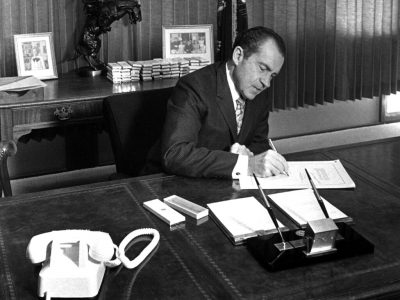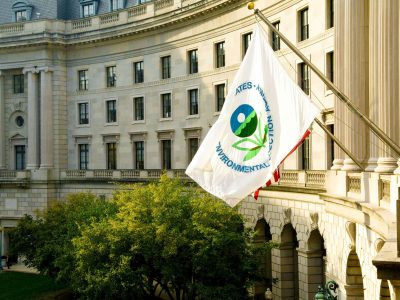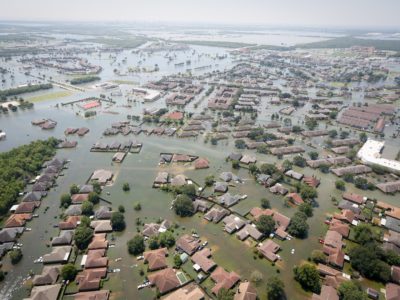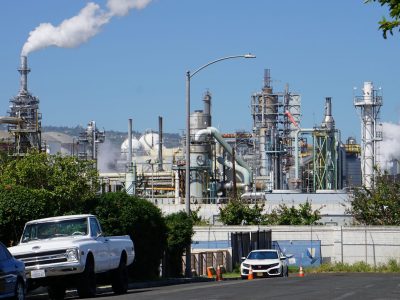Commemorating the National Environmental Policy Act’s 50th Anniversary
Celebrating NEPA: America's Most Transformative, Overarching & Catalytic Environmental Law
On a snowy New Year's Day in 1970--50 years ago today--then-President Richard Nixon signed into law the National Environmental Policy Act. NEPA's passage marked the beginning of America's modern environmental law era. It was followed by Congressional passage of a series of other federal environmental laws over the next decade--major statutes that to this day collectively remain the foundation of federal environmental environmental law and policy in the United S...
CONTINUE READINGRevolt of the Captive Scientists
Trump’s Scientific Advisory Board Slams Proposed EPA Rules
Trump has appointed most of the members of EPA’s Scientific Advisory Board (SAB), many of them selected from industry. That effort to stack SAB in favor of deregulation apparently wasn't a complete success. In draft reports issued this week, the SAB scathingly criticized those efforts and even went so far as to give a nod to California’s alternative approach. Clean Water Act. The Trump Administration has proposed drastically reducing EPA’s jurisdiction over we...
CONTINUE READINGBright Spots of 2019 (Yes, there were some!)
A bad year in many ways, but with promising signs for the future.
It’s been a tumultuous and often grim year in terms of environmental protection. The Trump Administration continued its onslaught against environmental protection, completing major regulatory rollbacks. Nevertheless, there were some rays of sun through the darkening clouds. State Initiatives. Progress as the state level continued, as it has throughout the Trump Administration. New York State adopted ambitious climate targets, including 100% carbon-free electrici...
CONTINUE READINGThreat Assessment: The Supreme Court & the Environment
The current bench is tilted against environmental regulation. It could get worse.
In September, Take Back the Court issued a study entitled, “The Roberts Court Would Likely Strike Down Climate Change Legislation.” In my view, that’s too alarmist. But the current conservative majority definitely will be an obstacle to aggressive use of government regulation. That could hold true well into the 2030s, depending on who leaves the Court and who’s in the White House at the time. The authors of that study were highlighting a very real concern, ...
CONTINUE READINGGifts We Receive Daily
Our everyday gifts: a livable climate, clean water and air, and biodiversity.
This is a time of year when by religious tradition or secular custom, many people exchange gifts. It's worth remembering that we also reach receive daily gifts in the form of what economists call public goods. I thought it might be worth reposting some Holiday Season musings on that subject. After all, the holiday season is a time for watching the same old movies and hearing the same old carols as before, so why shouldn't blog posts also be recycled?. Maybe discussion ...
CONTINUE READINGWhen is a Flood a Government Taking?
Should the feds be liable for flooding during Hurricane Harvey?
A federal statute bars nearly all claims against the federal government for flooding. Victims of flooding from Hurricane Harvey seem to have found a loophole by claiming that their property was taken without just compensation by flooding. The facts are unusual, but the case raises some deep questions about financial responsibility for flood control. Here the facts. In the 1920s and ‘30s, major downpours in Texas revealed that Houston might face catastrophic ri...
CONTINUE READINGWhither Climate Ambition
China can lead the way in 2020, but will it?
China, the world’s largest carbon emitter, has the opportunity to enhance global ambition on climate change action this coming year in the run-up to COP26 in Glasgow, Scotland. The question is whether it will do so. I attended COP25 in Madrid this month with colleagues and students on behalf of UCLA’s Emmett Institute on Climate Change and the Environment. This year’s meeting was largely seen as a failure; a missed opportunity for the countries of the worl...
CONTINUE READINGLight Over Darkness
New L.A. street lighting design competition spotlights barrier to walking, cycling, and public transit use
A design competition to improve street lighting launched by Mayor Eric Garcetti last week could help Los Angeles meet its climate targets by improving the experience of pedestrians, cyclists, and public transit users on city streets. The competition invites students and design professionals to submit ideas for a new standard L.A. streetlight design, with a winner to be announced in June 2020. Angelenos’ commitment to cars is one of the city’s most stubborn cha...
CONTINUE READINGCharting the Progress of the Latest Chapter in American Climate Change Litigation
State and Local Governments' Common Law-Based Lawsuits Against the Energy Industry Are Steadily Gaining Traction
The latest chapter in American climate change litigation has been launched by local governments--and one state--across the U.S. against domestic and international fossil fuel companies. These lawsuits have been brought under one of the oldest and most venerable legal doctrines--state common law. They seek compensation from the energy industry for the myriad, adverse effects of climate change on those governments and their residents. And this litigation is--slow...
CONTINUE READINGAn Oil and Gas Setback in Los Angeles Would Not Create Billions in Liability
A recent report from the Petroleum Administrator relied on incorrect and incomplete legal assumptions about the City's potential liability to oil and gas operators. Here's why it matters.
This week, Sean Hecht and I (in our capacity as attorneys in the Frank G. Wells Environmental Law Clinic at UCLA School of Law) sent a letter on behalf of the Los Angeles Neighborhood Land Trust to Mayor Eric Garcetti, the Los Angeles City Attorney's office, and the Los Angeles City Council. (Our letter built off of a similar one sent by attorneys with the NRDC, Communities for a Better Environment, and the Center for Biological Diversity, which we attached to our letter...
CONTINUE READING











